Entrepreneurship and Small Business Management Report: UK Economy
VerifiedAdded on 2020/12/09
|13
|3626
|220
Report
AI Summary
This report delves into the realm of entrepreneurship and small business management, examining various types of entrepreneurial ventures, including small, scalable, large, and social enterprises. It analyzes the similarities and differences between these ventures. The report further investigates the significant impact of small and micro-enterprises on the UK economy, particularly in the context of Brexit, highlighting their role in job creation, GDP growth, and innovation. It also explores the importance of small businesses and startups in fostering economic development. Additionally, the report contrasts the traits and characteristics of successful entrepreneurs, such as Jeff Bezos and Bill Gates, with those of business managers. The report provides statistical data and examples to support its findings, offering a comprehensive overview of entrepreneurship's role in economic growth and development.

Entrepreneurship and
Small Business
Management
Small Business
Management
Paraphrase This Document
Need a fresh take? Get an instant paraphrase of this document with our AI Paraphraser

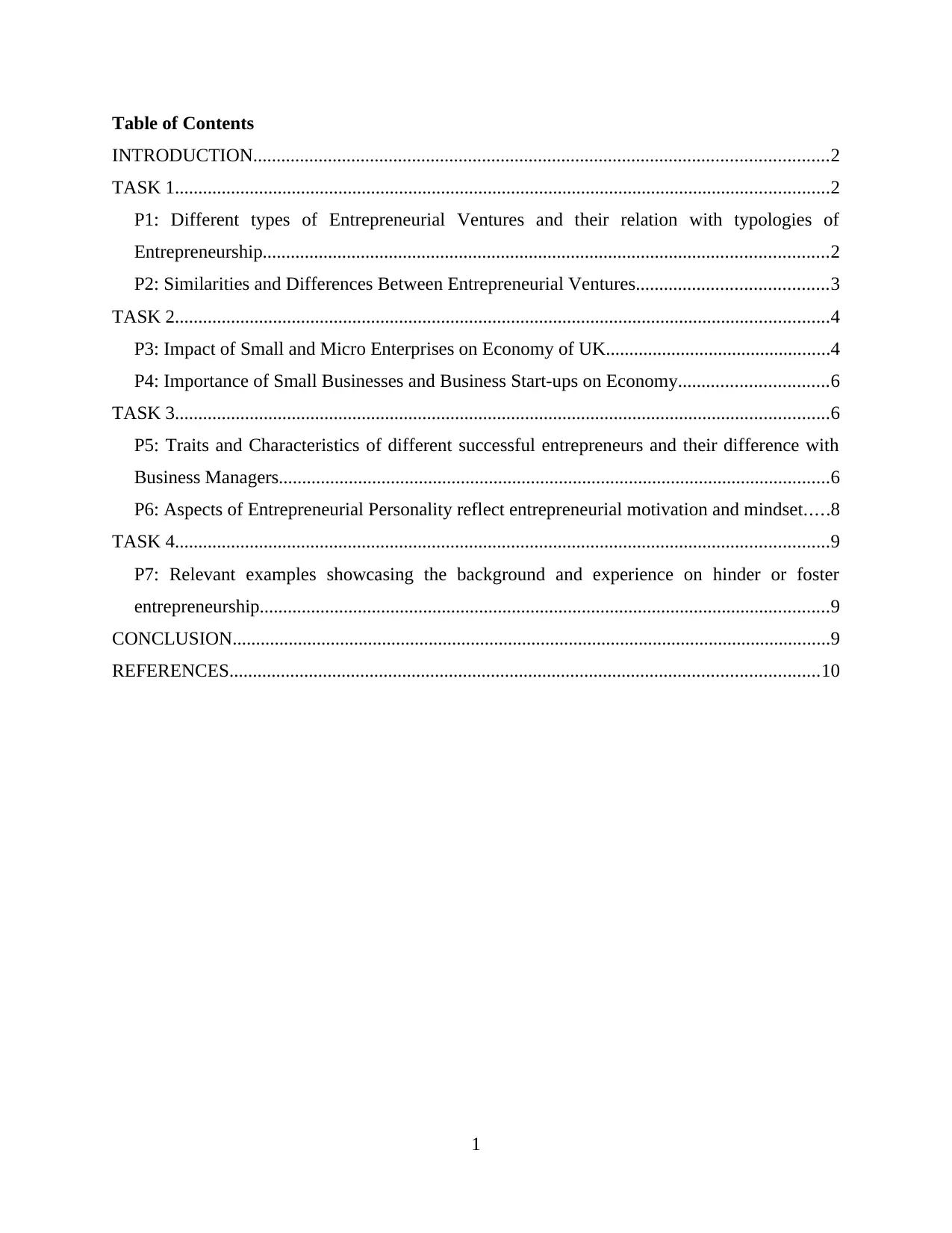
Table of Contents
INTRODUCTION...........................................................................................................................2
TASK 1............................................................................................................................................2
P1: Different types of Entrepreneurial Ventures and their relation with typologies of
Entrepreneurship.........................................................................................................................2
P2: Similarities and Differences Between Entrepreneurial Ventures.........................................3
TASK 2............................................................................................................................................4
P3: Impact of Small and Micro Enterprises on Economy of UK................................................4
P4: Importance of Small Businesses and Business Start-ups on Economy................................6
TASK 3............................................................................................................................................6
P5: Traits and Characteristics of different successful entrepreneurs and their difference with
Business Managers......................................................................................................................6
P6: Aspects of Entrepreneurial Personality reflect entrepreneurial motivation and mindset.....8
TASK 4............................................................................................................................................9
P7: Relevant examples showcasing the background and experience on hinder or foster
entrepreneurship..........................................................................................................................9
CONCLUSION................................................................................................................................9
REFERENCES..............................................................................................................................10
1
INTRODUCTION...........................................................................................................................2
TASK 1............................................................................................................................................2
P1: Different types of Entrepreneurial Ventures and their relation with typologies of
Entrepreneurship.........................................................................................................................2
P2: Similarities and Differences Between Entrepreneurial Ventures.........................................3
TASK 2............................................................................................................................................4
P3: Impact of Small and Micro Enterprises on Economy of UK................................................4
P4: Importance of Small Businesses and Business Start-ups on Economy................................6
TASK 3............................................................................................................................................6
P5: Traits and Characteristics of different successful entrepreneurs and their difference with
Business Managers......................................................................................................................6
P6: Aspects of Entrepreneurial Personality reflect entrepreneurial motivation and mindset.....8
TASK 4............................................................................................................................................9
P7: Relevant examples showcasing the background and experience on hinder or foster
entrepreneurship..........................................................................................................................9
CONCLUSION................................................................................................................................9
REFERENCES..............................................................................................................................10
1
⊘ This is a preview!⊘
Do you want full access?
Subscribe today to unlock all pages.

Trusted by 1+ million students worldwide
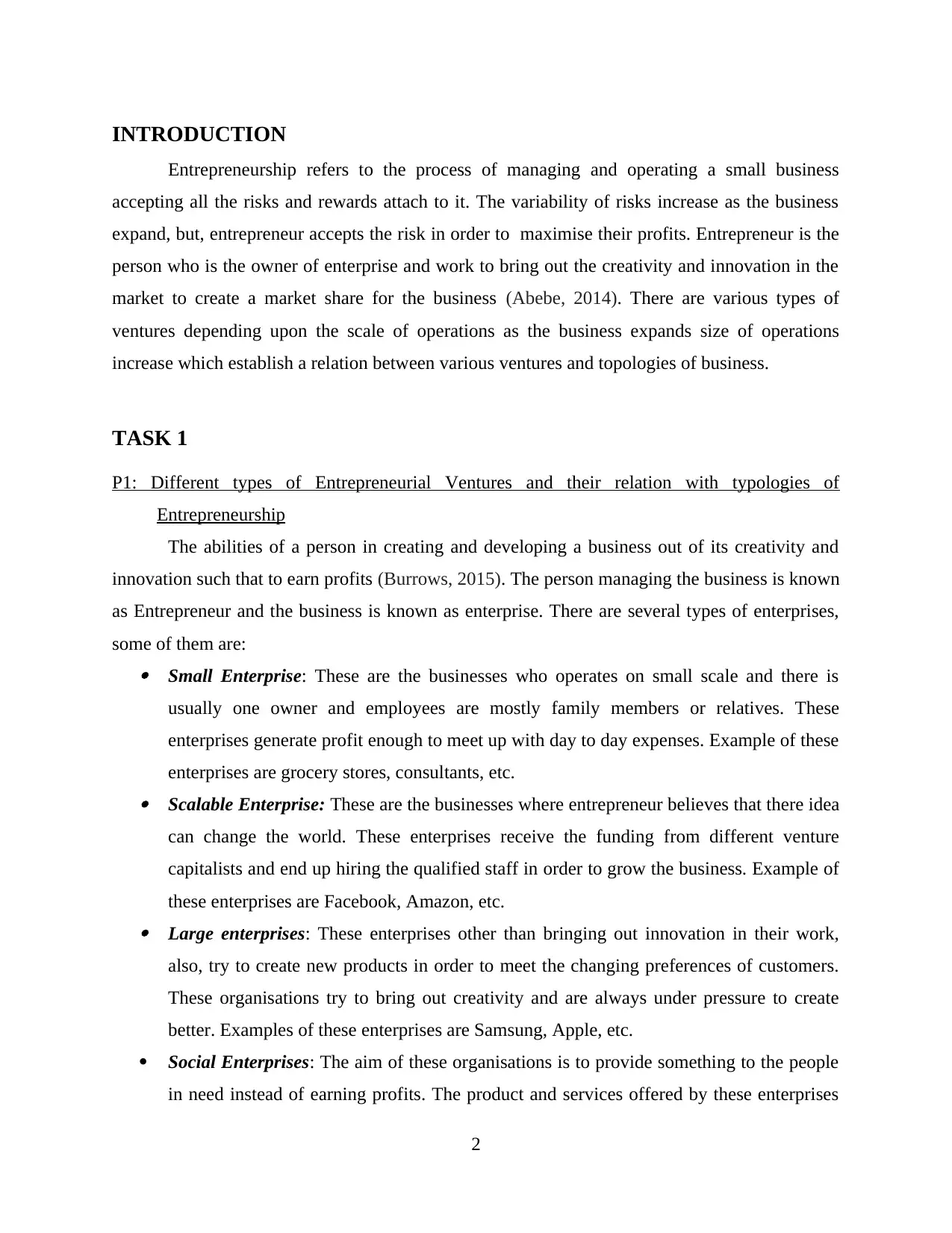
INTRODUCTION
Entrepreneurship refers to the process of managing and operating a small business
accepting all the risks and rewards attach to it. The variability of risks increase as the business
expand, but, entrepreneur accepts the risk in order to maximise their profits. Entrepreneur is the
person who is the owner of enterprise and work to bring out the creativity and innovation in the
market to create a market share for the business (Abebe, 2014). There are various types of
ventures depending upon the scale of operations as the business expands size of operations
increase which establish a relation between various ventures and topologies of business.
TASK 1
P1: Different types of Entrepreneurial Ventures and their relation with typologies of
Entrepreneurship
The abilities of a person in creating and developing a business out of its creativity and
innovation such that to earn profits (Burrows, 2015). The person managing the business is known
as Entrepreneur and the business is known as enterprise. There are several types of enterprises,
some of them are: Small Enterprise: These are the businesses who operates on small scale and there is
usually one owner and employees are mostly family members or relatives. These
enterprises generate profit enough to meet up with day to day expenses. Example of these
enterprises are grocery stores, consultants, etc. Scalable Enterprise: These are the businesses where entrepreneur believes that there idea
can change the world. These enterprises receive the funding from different venture
capitalists and end up hiring the qualified staff in order to grow the business. Example of
these enterprises are Facebook, Amazon, etc. Large enterprises: These enterprises other than bringing out innovation in their work,
also, try to create new products in order to meet the changing preferences of customers.
These organisations try to bring out creativity and are always under pressure to create
better. Examples of these enterprises are Samsung, Apple, etc.
Social Enterprises: The aim of these organisations is to provide something to the people
in need instead of earning profits. The product and services offered by these enterprises
2
Entrepreneurship refers to the process of managing and operating a small business
accepting all the risks and rewards attach to it. The variability of risks increase as the business
expand, but, entrepreneur accepts the risk in order to maximise their profits. Entrepreneur is the
person who is the owner of enterprise and work to bring out the creativity and innovation in the
market to create a market share for the business (Abebe, 2014). There are various types of
ventures depending upon the scale of operations as the business expands size of operations
increase which establish a relation between various ventures and topologies of business.
TASK 1
P1: Different types of Entrepreneurial Ventures and their relation with typologies of
Entrepreneurship
The abilities of a person in creating and developing a business out of its creativity and
innovation such that to earn profits (Burrows, 2015). The person managing the business is known
as Entrepreneur and the business is known as enterprise. There are several types of enterprises,
some of them are: Small Enterprise: These are the businesses who operates on small scale and there is
usually one owner and employees are mostly family members or relatives. These
enterprises generate profit enough to meet up with day to day expenses. Example of these
enterprises are grocery stores, consultants, etc. Scalable Enterprise: These are the businesses where entrepreneur believes that there idea
can change the world. These enterprises receive the funding from different venture
capitalists and end up hiring the qualified staff in order to grow the business. Example of
these enterprises are Facebook, Amazon, etc. Large enterprises: These enterprises other than bringing out innovation in their work,
also, try to create new products in order to meet the changing preferences of customers.
These organisations try to bring out creativity and are always under pressure to create
better. Examples of these enterprises are Samsung, Apple, etc.
Social Enterprises: The aim of these organisations is to provide something to the people
in need instead of earning profits. The product and services offered by these enterprises
2
Paraphrase This Document
Need a fresh take? Get an instant paraphrase of this document with our AI Paraphraser
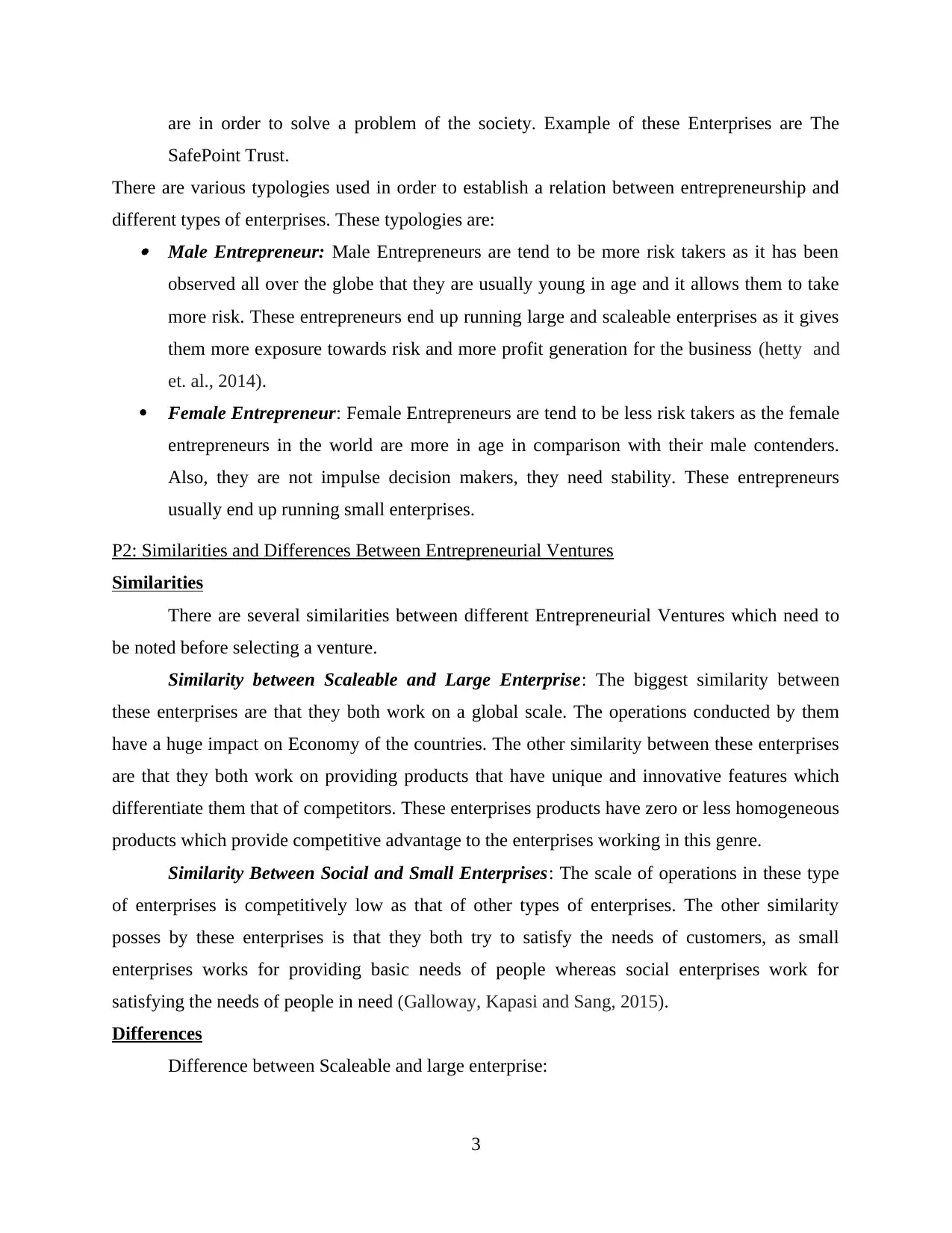
are in order to solve a problem of the society. Example of these Enterprises are The
SafePoint Trust.
There are various typologies used in order to establish a relation between entrepreneurship and
different types of enterprises. These typologies are: Male Entrepreneur: Male Entrepreneurs are tend to be more risk takers as it has been
observed all over the globe that they are usually young in age and it allows them to take
more risk. These entrepreneurs end up running large and scaleable enterprises as it gives
them more exposure towards risk and more profit generation for the business (hetty and
et. al., 2014).
Female Entrepreneur: Female Entrepreneurs are tend to be less risk takers as the female
entrepreneurs in the world are more in age in comparison with their male contenders.
Also, they are not impulse decision makers, they need stability. These entrepreneurs
usually end up running small enterprises.
P2: Similarities and Differences Between Entrepreneurial Ventures
Similarities
There are several similarities between different Entrepreneurial Ventures which need to
be noted before selecting a venture.
Similarity between Scaleable and Large Enterprise: The biggest similarity between
these enterprises are that they both work on a global scale. The operations conducted by them
have a huge impact on Economy of the countries. The other similarity between these enterprises
are that they both work on providing products that have unique and innovative features which
differentiate them that of competitors. These enterprises products have zero or less homogeneous
products which provide competitive advantage to the enterprises working in this genre.
Similarity Between Social and Small Enterprises: The scale of operations in these type
of enterprises is competitively low as that of other types of enterprises. The other similarity
posses by these enterprises is that they both try to satisfy the needs of customers, as small
enterprises works for providing basic needs of people whereas social enterprises work for
satisfying the needs of people in need (Galloway, Kapasi and Sang, 2015).
Differences
Difference between Scaleable and large enterprise:
3
SafePoint Trust.
There are various typologies used in order to establish a relation between entrepreneurship and
different types of enterprises. These typologies are: Male Entrepreneur: Male Entrepreneurs are tend to be more risk takers as it has been
observed all over the globe that they are usually young in age and it allows them to take
more risk. These entrepreneurs end up running large and scaleable enterprises as it gives
them more exposure towards risk and more profit generation for the business (hetty and
et. al., 2014).
Female Entrepreneur: Female Entrepreneurs are tend to be less risk takers as the female
entrepreneurs in the world are more in age in comparison with their male contenders.
Also, they are not impulse decision makers, they need stability. These entrepreneurs
usually end up running small enterprises.
P2: Similarities and Differences Between Entrepreneurial Ventures
Similarities
There are several similarities between different Entrepreneurial Ventures which need to
be noted before selecting a venture.
Similarity between Scaleable and Large Enterprise: The biggest similarity between
these enterprises are that they both work on a global scale. The operations conducted by them
have a huge impact on Economy of the countries. The other similarity between these enterprises
are that they both work on providing products that have unique and innovative features which
differentiate them that of competitors. These enterprises products have zero or less homogeneous
products which provide competitive advantage to the enterprises working in this genre.
Similarity Between Social and Small Enterprises: The scale of operations in these type
of enterprises is competitively low as that of other types of enterprises. The other similarity
posses by these enterprises is that they both try to satisfy the needs of customers, as small
enterprises works for providing basic needs of people whereas social enterprises work for
satisfying the needs of people in need (Galloway, Kapasi and Sang, 2015).
Differences
Difference between Scaleable and large enterprise:
3
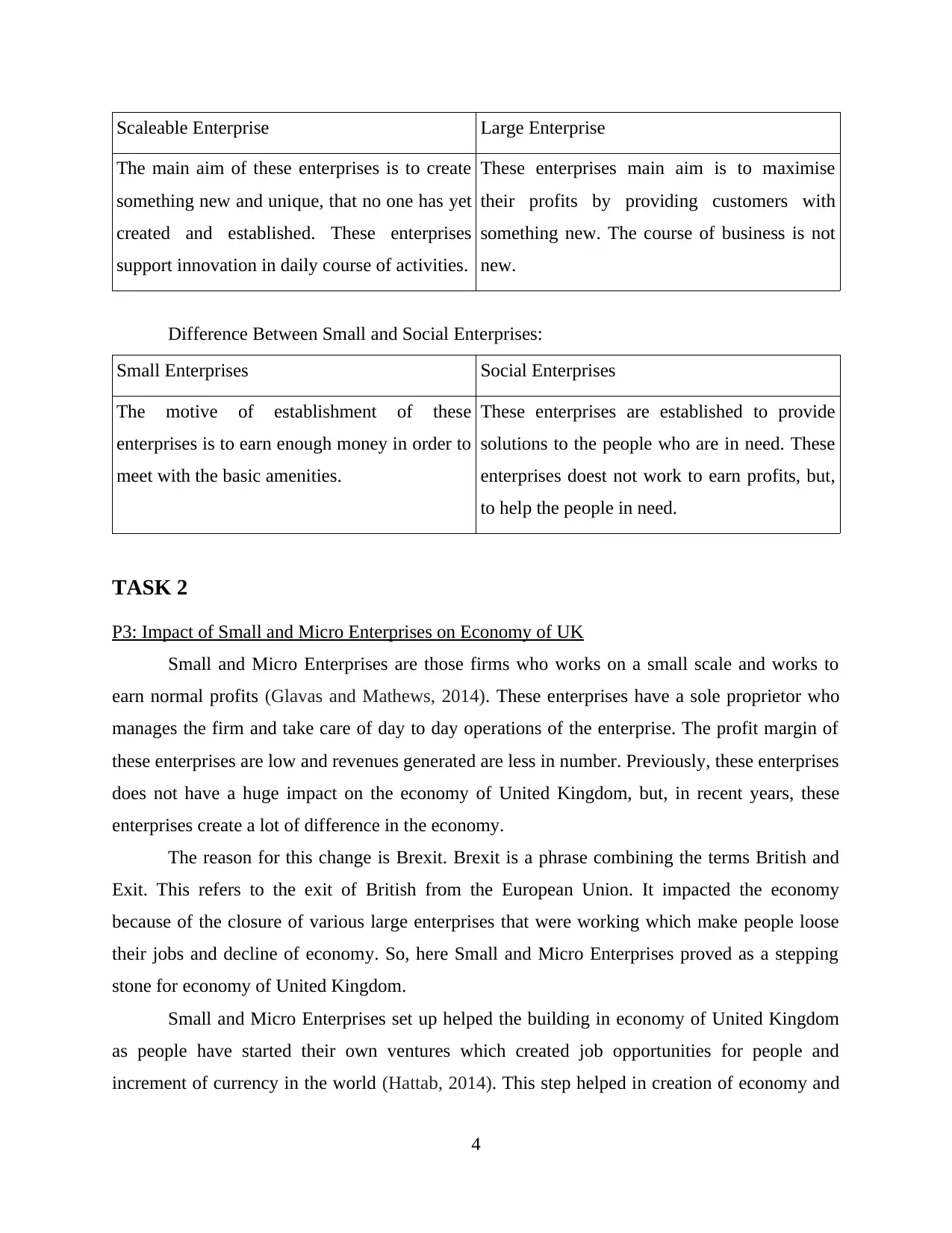
Scaleable Enterprise Large Enterprise
The main aim of these enterprises is to create
something new and unique, that no one has yet
created and established. These enterprises
support innovation in daily course of activities.
These enterprises main aim is to maximise
their profits by providing customers with
something new. The course of business is not
new.
Difference Between Small and Social Enterprises:
Small Enterprises Social Enterprises
The motive of establishment of these
enterprises is to earn enough money in order to
meet with the basic amenities.
These enterprises are established to provide
solutions to the people who are in need. These
enterprises doest not work to earn profits, but,
to help the people in need.
TASK 2
P3: Impact of Small and Micro Enterprises on Economy of UK
Small and Micro Enterprises are those firms who works on a small scale and works to
earn normal profits (Glavas and Mathews, 2014). These enterprises have a sole proprietor who
manages the firm and take care of day to day operations of the enterprise. The profit margin of
these enterprises are low and revenues generated are less in number. Previously, these enterprises
does not have a huge impact on the economy of United Kingdom, but, in recent years, these
enterprises create a lot of difference in the economy.
The reason for this change is Brexit. Brexit is a phrase combining the terms British and
Exit. This refers to the exit of British from the European Union. It impacted the economy
because of the closure of various large enterprises that were working which make people loose
their jobs and decline of economy. So, here Small and Micro Enterprises proved as a stepping
stone for economy of United Kingdom.
Small and Micro Enterprises set up helped the building in economy of United Kingdom
as people have started their own ventures which created job opportunities for people and
increment of currency in the world (Hattab, 2014). This step helped in creation of economy and
4
The main aim of these enterprises is to create
something new and unique, that no one has yet
created and established. These enterprises
support innovation in daily course of activities.
These enterprises main aim is to maximise
their profits by providing customers with
something new. The course of business is not
new.
Difference Between Small and Social Enterprises:
Small Enterprises Social Enterprises
The motive of establishment of these
enterprises is to earn enough money in order to
meet with the basic amenities.
These enterprises are established to provide
solutions to the people who are in need. These
enterprises doest not work to earn profits, but,
to help the people in need.
TASK 2
P3: Impact of Small and Micro Enterprises on Economy of UK
Small and Micro Enterprises are those firms who works on a small scale and works to
earn normal profits (Glavas and Mathews, 2014). These enterprises have a sole proprietor who
manages the firm and take care of day to day operations of the enterprise. The profit margin of
these enterprises are low and revenues generated are less in number. Previously, these enterprises
does not have a huge impact on the economy of United Kingdom, but, in recent years, these
enterprises create a lot of difference in the economy.
The reason for this change is Brexit. Brexit is a phrase combining the terms British and
Exit. This refers to the exit of British from the European Union. It impacted the economy
because of the closure of various large enterprises that were working which make people loose
their jobs and decline of economy. So, here Small and Micro Enterprises proved as a stepping
stone for economy of United Kingdom.
Small and Micro Enterprises set up helped the building in economy of United Kingdom
as people have started their own ventures which created job opportunities for people and
increment of currency in the world (Hattab, 2014). This step helped in creation of economy and
4
⊘ This is a preview!⊘
Do you want full access?
Subscribe today to unlock all pages.

Trusted by 1+ million students worldwide
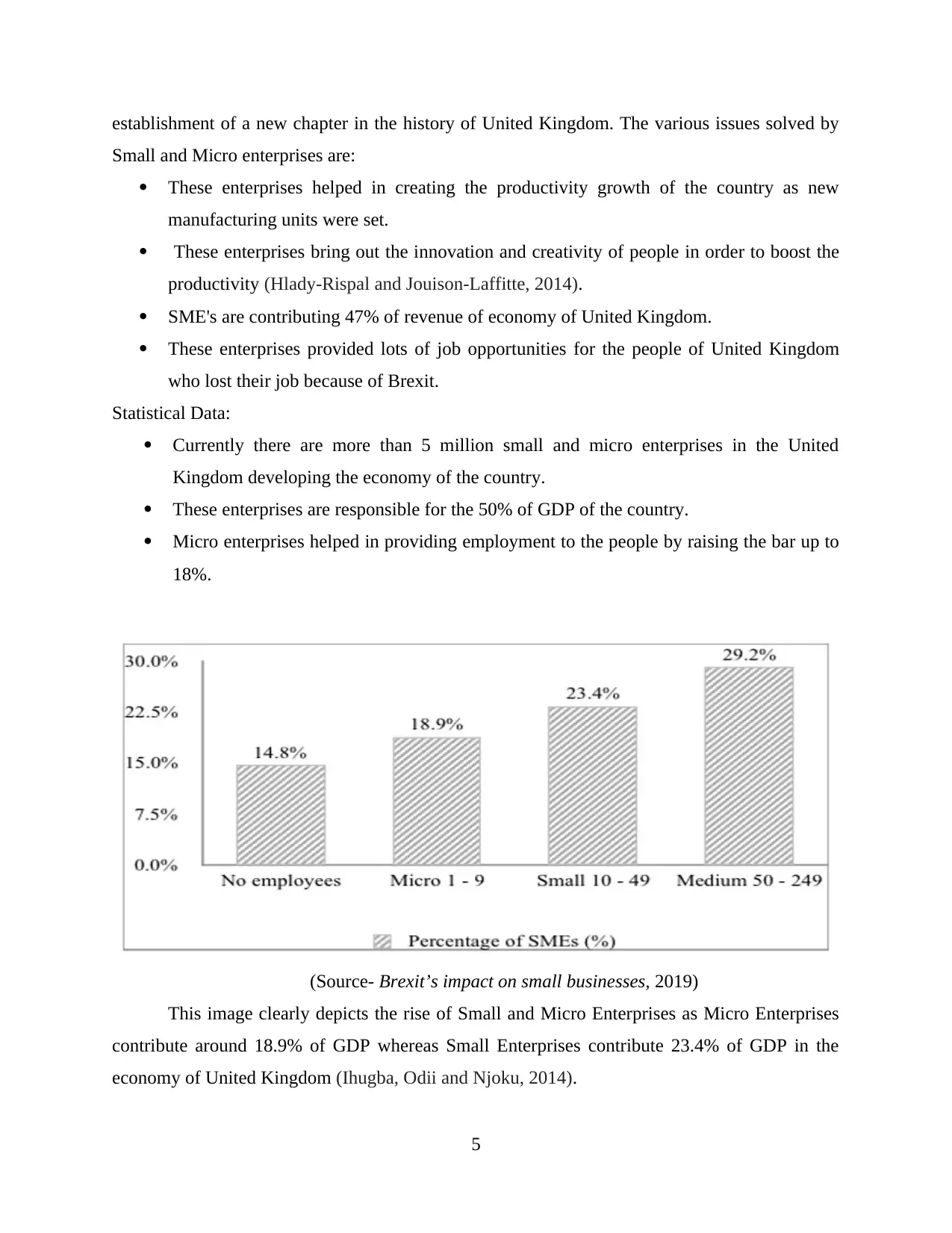
establishment of a new chapter in the history of United Kingdom. The various issues solved by
Small and Micro enterprises are:
These enterprises helped in creating the productivity growth of the country as new
manufacturing units were set.
These enterprises bring out the innovation and creativity of people in order to boost the
productivity (Hlady‐Rispal and Jouison‐Laffitte, 2014).
SME's are contributing 47% of revenue of economy of United Kingdom.
These enterprises provided lots of job opportunities for the people of United Kingdom
who lost their job because of Brexit.
Statistical Data:
Currently there are more than 5 million small and micro enterprises in the United
Kingdom developing the economy of the country.
These enterprises are responsible for the 50% of GDP of the country.
Micro enterprises helped in providing employment to the people by raising the bar up to
18%.
(Source- Brexit’s impact on small businesses, 2019)
This image clearly depicts the rise of Small and Micro Enterprises as Micro Enterprises
contribute around 18.9% of GDP whereas Small Enterprises contribute 23.4% of GDP in the
economy of United Kingdom (Ihugba, Odii and Njoku, 2014).
5
Small and Micro enterprises are:
These enterprises helped in creating the productivity growth of the country as new
manufacturing units were set.
These enterprises bring out the innovation and creativity of people in order to boost the
productivity (Hlady‐Rispal and Jouison‐Laffitte, 2014).
SME's are contributing 47% of revenue of economy of United Kingdom.
These enterprises provided lots of job opportunities for the people of United Kingdom
who lost their job because of Brexit.
Statistical Data:
Currently there are more than 5 million small and micro enterprises in the United
Kingdom developing the economy of the country.
These enterprises are responsible for the 50% of GDP of the country.
Micro enterprises helped in providing employment to the people by raising the bar up to
18%.
(Source- Brexit’s impact on small businesses, 2019)
This image clearly depicts the rise of Small and Micro Enterprises as Micro Enterprises
contribute around 18.9% of GDP whereas Small Enterprises contribute 23.4% of GDP in the
economy of United Kingdom (Ihugba, Odii and Njoku, 2014).
5
Paraphrase This Document
Need a fresh take? Get an instant paraphrase of this document with our AI Paraphraser
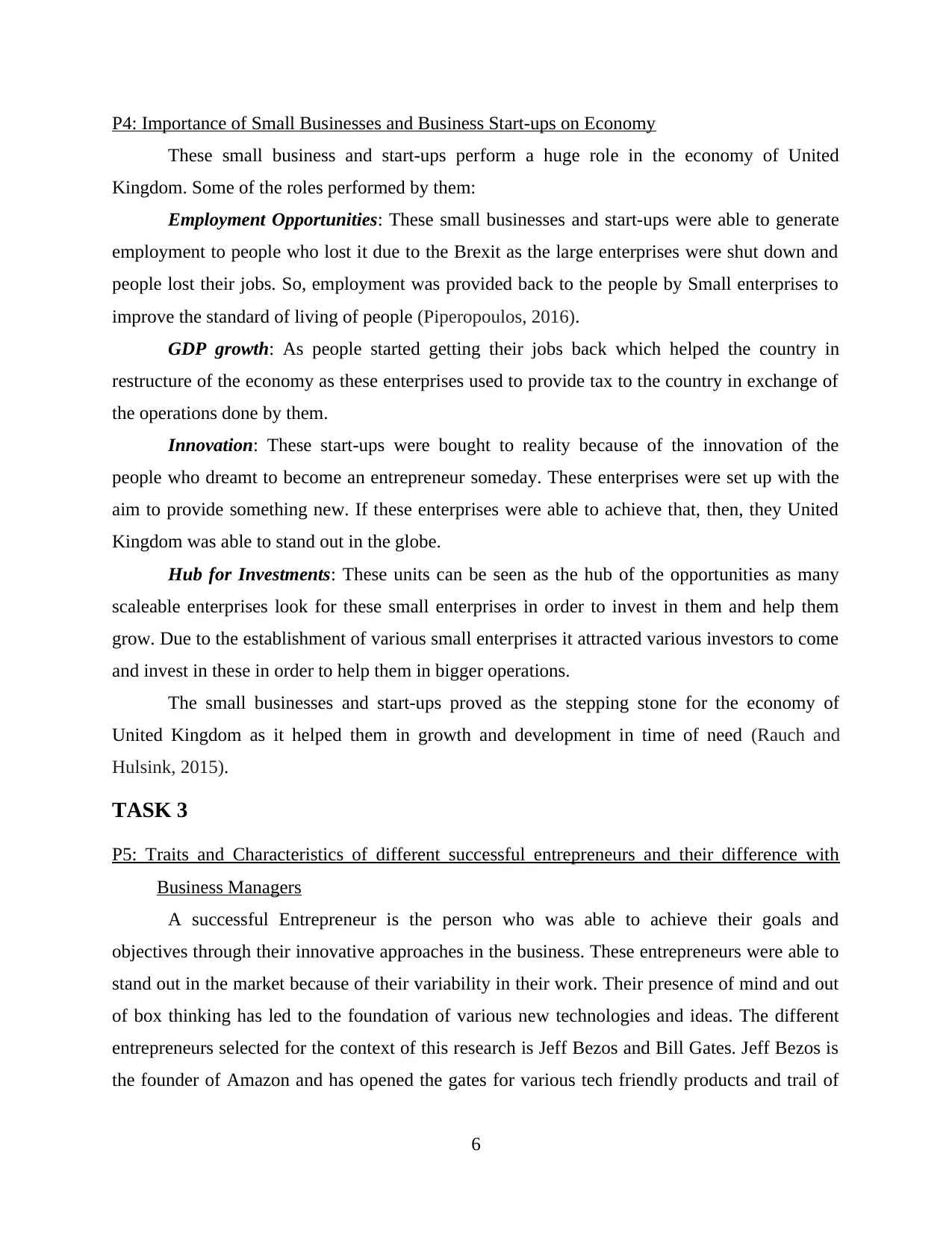
P4: Importance of Small Businesses and Business Start-ups on Economy
These small business and start-ups perform a huge role in the economy of United
Kingdom. Some of the roles performed by them:
Employment Opportunities: These small businesses and start-ups were able to generate
employment to people who lost it due to the Brexit as the large enterprises were shut down and
people lost their jobs. So, employment was provided back to the people by Small enterprises to
improve the standard of living of people (Piperopoulos, 2016).
GDP growth: As people started getting their jobs back which helped the country in
restructure of the economy as these enterprises used to provide tax to the country in exchange of
the operations done by them.
Innovation: These start-ups were bought to reality because of the innovation of the
people who dreamt to become an entrepreneur someday. These enterprises were set up with the
aim to provide something new. If these enterprises were able to achieve that, then, they United
Kingdom was able to stand out in the globe.
Hub for Investments: These units can be seen as the hub of the opportunities as many
scaleable enterprises look for these small enterprises in order to invest in them and help them
grow. Due to the establishment of various small enterprises it attracted various investors to come
and invest in these in order to help them in bigger operations.
The small businesses and start-ups proved as the stepping stone for the economy of
United Kingdom as it helped them in growth and development in time of need (Rauch and
Hulsink, 2015).
TASK 3
P5: Traits and Characteristics of different successful entrepreneurs and their difference with
Business Managers
A successful Entrepreneur is the person who was able to achieve their goals and
objectives through their innovative approaches in the business. These entrepreneurs were able to
stand out in the market because of their variability in their work. Their presence of mind and out
of box thinking has led to the foundation of various new technologies and ideas. The different
entrepreneurs selected for the context of this research is Jeff Bezos and Bill Gates. Jeff Bezos is
the founder of Amazon and has opened the gates for various tech friendly products and trail of
6
These small business and start-ups perform a huge role in the economy of United
Kingdom. Some of the roles performed by them:
Employment Opportunities: These small businesses and start-ups were able to generate
employment to people who lost it due to the Brexit as the large enterprises were shut down and
people lost their jobs. So, employment was provided back to the people by Small enterprises to
improve the standard of living of people (Piperopoulos, 2016).
GDP growth: As people started getting their jobs back which helped the country in
restructure of the economy as these enterprises used to provide tax to the country in exchange of
the operations done by them.
Innovation: These start-ups were bought to reality because of the innovation of the
people who dreamt to become an entrepreneur someday. These enterprises were set up with the
aim to provide something new. If these enterprises were able to achieve that, then, they United
Kingdom was able to stand out in the globe.
Hub for Investments: These units can be seen as the hub of the opportunities as many
scaleable enterprises look for these small enterprises in order to invest in them and help them
grow. Due to the establishment of various small enterprises it attracted various investors to come
and invest in these in order to help them in bigger operations.
The small businesses and start-ups proved as the stepping stone for the economy of
United Kingdom as it helped them in growth and development in time of need (Rauch and
Hulsink, 2015).
TASK 3
P5: Traits and Characteristics of different successful entrepreneurs and their difference with
Business Managers
A successful Entrepreneur is the person who was able to achieve their goals and
objectives through their innovative approaches in the business. These entrepreneurs were able to
stand out in the market because of their variability in their work. Their presence of mind and out
of box thinking has led to the foundation of various new technologies and ideas. The different
entrepreneurs selected for the context of this research is Jeff Bezos and Bill Gates. Jeff Bezos is
the founder of Amazon and has opened the gates for various tech friendly products and trail of
6
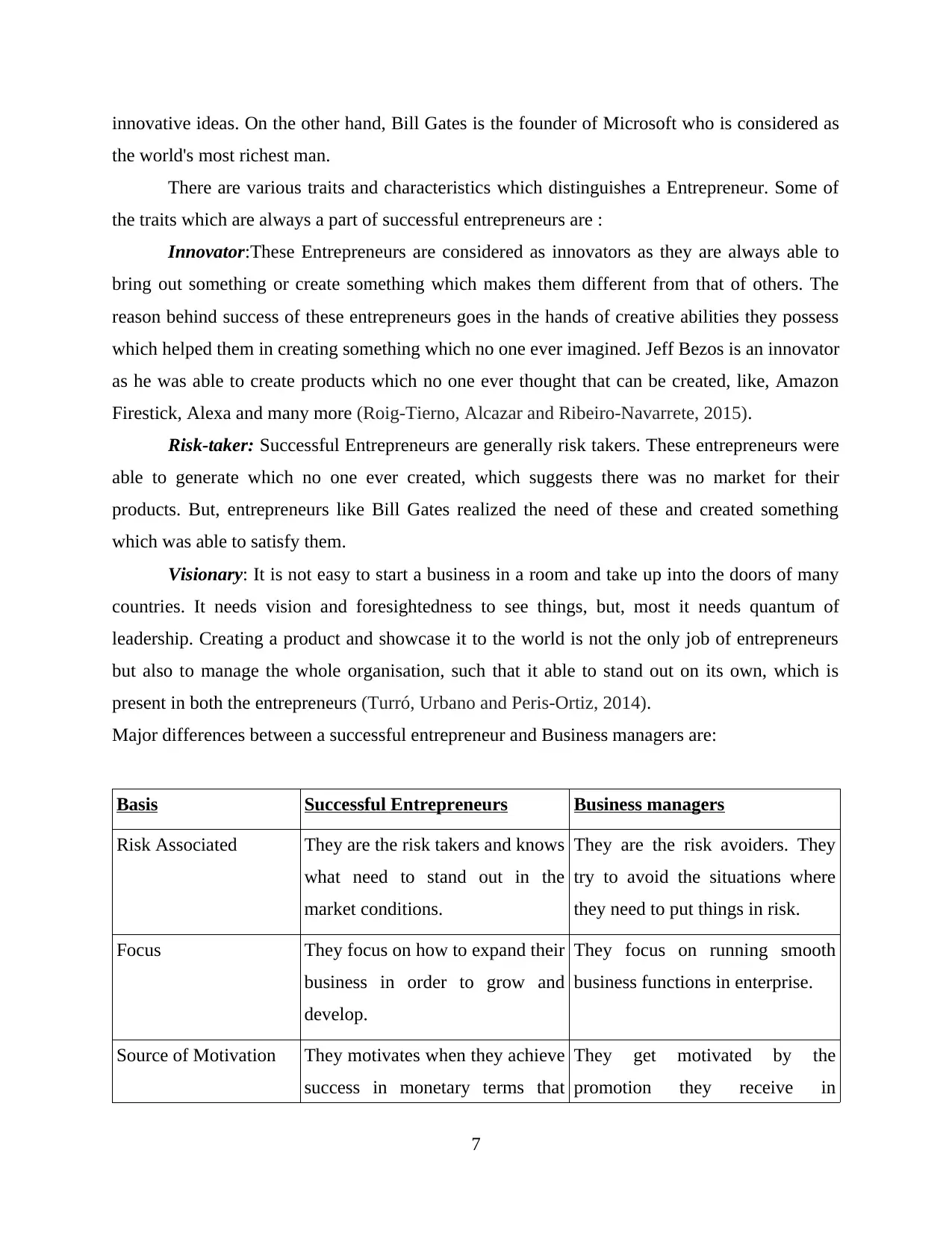
innovative ideas. On the other hand, Bill Gates is the founder of Microsoft who is considered as
the world's most richest man.
There are various traits and characteristics which distinguishes a Entrepreneur. Some of
the traits which are always a part of successful entrepreneurs are :
Innovator:These Entrepreneurs are considered as innovators as they are always able to
bring out something or create something which makes them different from that of others. The
reason behind success of these entrepreneurs goes in the hands of creative abilities they possess
which helped them in creating something which no one ever imagined. Jeff Bezos is an innovator
as he was able to create products which no one ever thought that can be created, like, Amazon
Firestick, Alexa and many more (Roig-Tierno, Alcazar and Ribeiro-Navarrete, 2015).
Risk-taker: Successful Entrepreneurs are generally risk takers. These entrepreneurs were
able to generate which no one ever created, which suggests there was no market for their
products. But, entrepreneurs like Bill Gates realized the need of these and created something
which was able to satisfy them.
Visionary: It is not easy to start a business in a room and take up into the doors of many
countries. It needs vision and foresightedness to see things, but, most it needs quantum of
leadership. Creating a product and showcase it to the world is not the only job of entrepreneurs
but also to manage the whole organisation, such that it able to stand out on its own, which is
present in both the entrepreneurs (Turró, Urbano and Peris-Ortiz, 2014).
Major differences between a successful entrepreneur and Business managers are:
Basis Successful Entrepreneurs Business managers
Risk Associated They are the risk takers and knows
what need to stand out in the
market conditions.
They are the risk avoiders. They
try to avoid the situations where
they need to put things in risk.
Focus They focus on how to expand their
business in order to grow and
develop.
They focus on running smooth
business functions in enterprise.
Source of Motivation They motivates when they achieve
success in monetary terms that
They get motivated by the
promotion they receive in
7
the world's most richest man.
There are various traits and characteristics which distinguishes a Entrepreneur. Some of
the traits which are always a part of successful entrepreneurs are :
Innovator:These Entrepreneurs are considered as innovators as they are always able to
bring out something or create something which makes them different from that of others. The
reason behind success of these entrepreneurs goes in the hands of creative abilities they possess
which helped them in creating something which no one ever imagined. Jeff Bezos is an innovator
as he was able to create products which no one ever thought that can be created, like, Amazon
Firestick, Alexa and many more (Roig-Tierno, Alcazar and Ribeiro-Navarrete, 2015).
Risk-taker: Successful Entrepreneurs are generally risk takers. These entrepreneurs were
able to generate which no one ever created, which suggests there was no market for their
products. But, entrepreneurs like Bill Gates realized the need of these and created something
which was able to satisfy them.
Visionary: It is not easy to start a business in a room and take up into the doors of many
countries. It needs vision and foresightedness to see things, but, most it needs quantum of
leadership. Creating a product and showcase it to the world is not the only job of entrepreneurs
but also to manage the whole organisation, such that it able to stand out on its own, which is
present in both the entrepreneurs (Turró, Urbano and Peris-Ortiz, 2014).
Major differences between a successful entrepreneur and Business managers are:
Basis Successful Entrepreneurs Business managers
Risk Associated They are the risk takers and knows
what need to stand out in the
market conditions.
They are the risk avoiders. They
try to avoid the situations where
they need to put things in risk.
Focus They focus on how to expand their
business in order to grow and
develop.
They focus on running smooth
business functions in enterprise.
Source of Motivation They motivates when they achieve
success in monetary terms that
They get motivated by the
promotion they receive in
7
⊘ This is a preview!⊘
Do you want full access?
Subscribe today to unlock all pages.

Trusted by 1+ million students worldwide
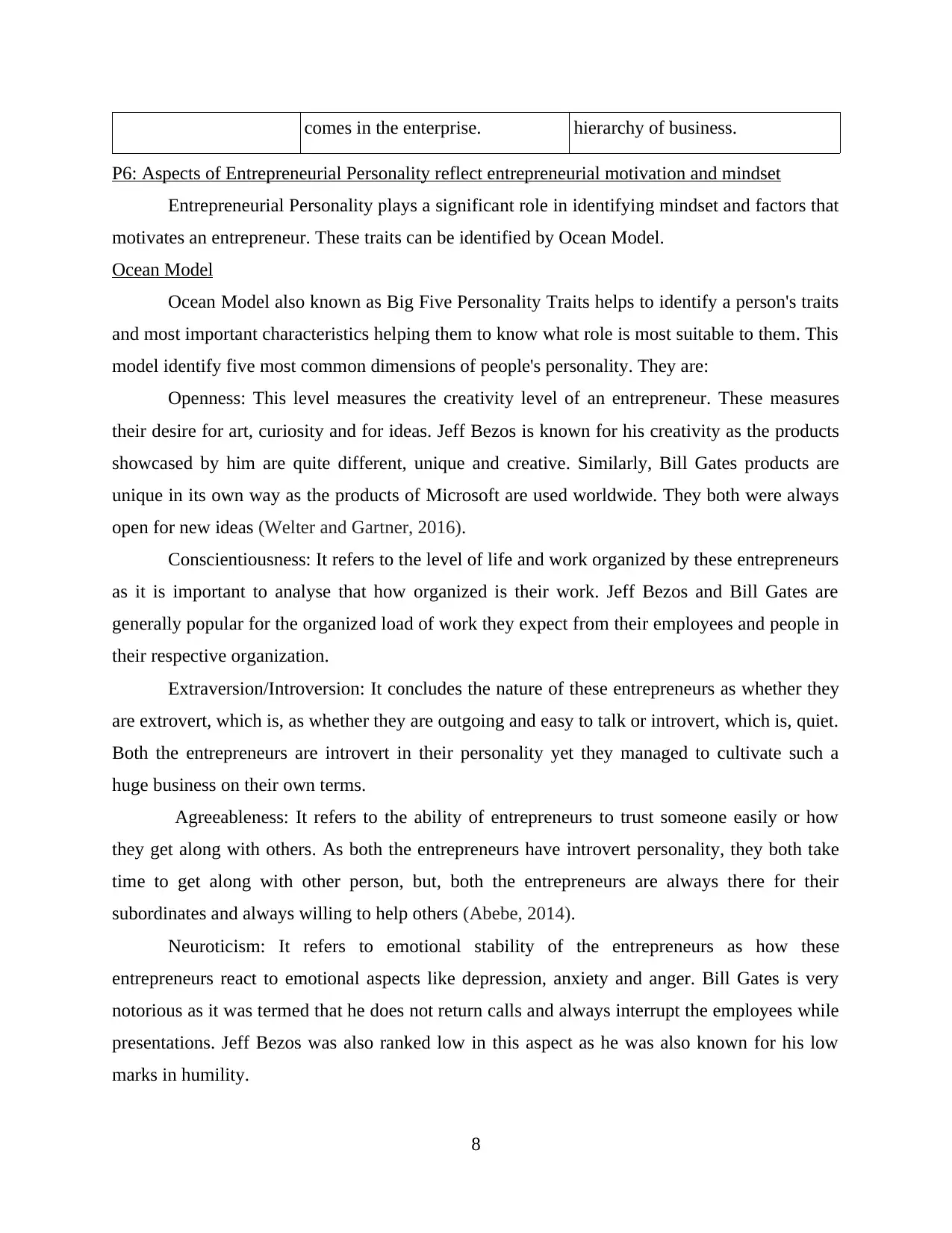
comes in the enterprise. hierarchy of business.
P6: Aspects of Entrepreneurial Personality reflect entrepreneurial motivation and mindset
Entrepreneurial Personality plays a significant role in identifying mindset and factors that
motivates an entrepreneur. These traits can be identified by Ocean Model.
Ocean Model
Ocean Model also known as Big Five Personality Traits helps to identify a person's traits
and most important characteristics helping them to know what role is most suitable to them. This
model identify five most common dimensions of people's personality. They are:
Openness: This level measures the creativity level of an entrepreneur. These measures
their desire for art, curiosity and for ideas. Jeff Bezos is known for his creativity as the products
showcased by him are quite different, unique and creative. Similarly, Bill Gates products are
unique in its own way as the products of Microsoft are used worldwide. They both were always
open for new ideas (Welter and Gartner, 2016).
Conscientiousness: It refers to the level of life and work organized by these entrepreneurs
as it is important to analyse that how organized is their work. Jeff Bezos and Bill Gates are
generally popular for the organized load of work they expect from their employees and people in
their respective organization.
Extraversion/Introversion: It concludes the nature of these entrepreneurs as whether they
are extrovert, which is, as whether they are outgoing and easy to talk or introvert, which is, quiet.
Both the entrepreneurs are introvert in their personality yet they managed to cultivate such a
huge business on their own terms.
Agreeableness: It refers to the ability of entrepreneurs to trust someone easily or how
they get along with others. As both the entrepreneurs have introvert personality, they both take
time to get along with other person, but, both the entrepreneurs are always there for their
subordinates and always willing to help others (Abebe, 2014).
Neuroticism: It refers to emotional stability of the entrepreneurs as how these
entrepreneurs react to emotional aspects like depression, anxiety and anger. Bill Gates is very
notorious as it was termed that he does not return calls and always interrupt the employees while
presentations. Jeff Bezos was also ranked low in this aspect as he was also known for his low
marks in humility.
8
P6: Aspects of Entrepreneurial Personality reflect entrepreneurial motivation and mindset
Entrepreneurial Personality plays a significant role in identifying mindset and factors that
motivates an entrepreneur. These traits can be identified by Ocean Model.
Ocean Model
Ocean Model also known as Big Five Personality Traits helps to identify a person's traits
and most important characteristics helping them to know what role is most suitable to them. This
model identify five most common dimensions of people's personality. They are:
Openness: This level measures the creativity level of an entrepreneur. These measures
their desire for art, curiosity and for ideas. Jeff Bezos is known for his creativity as the products
showcased by him are quite different, unique and creative. Similarly, Bill Gates products are
unique in its own way as the products of Microsoft are used worldwide. They both were always
open for new ideas (Welter and Gartner, 2016).
Conscientiousness: It refers to the level of life and work organized by these entrepreneurs
as it is important to analyse that how organized is their work. Jeff Bezos and Bill Gates are
generally popular for the organized load of work they expect from their employees and people in
their respective organization.
Extraversion/Introversion: It concludes the nature of these entrepreneurs as whether they
are extrovert, which is, as whether they are outgoing and easy to talk or introvert, which is, quiet.
Both the entrepreneurs are introvert in their personality yet they managed to cultivate such a
huge business on their own terms.
Agreeableness: It refers to the ability of entrepreneurs to trust someone easily or how
they get along with others. As both the entrepreneurs have introvert personality, they both take
time to get along with other person, but, both the entrepreneurs are always there for their
subordinates and always willing to help others (Abebe, 2014).
Neuroticism: It refers to emotional stability of the entrepreneurs as how these
entrepreneurs react to emotional aspects like depression, anxiety and anger. Bill Gates is very
notorious as it was termed that he does not return calls and always interrupt the employees while
presentations. Jeff Bezos was also ranked low in this aspect as he was also known for his low
marks in humility.
8
Paraphrase This Document
Need a fresh take? Get an instant paraphrase of this document with our AI Paraphraser
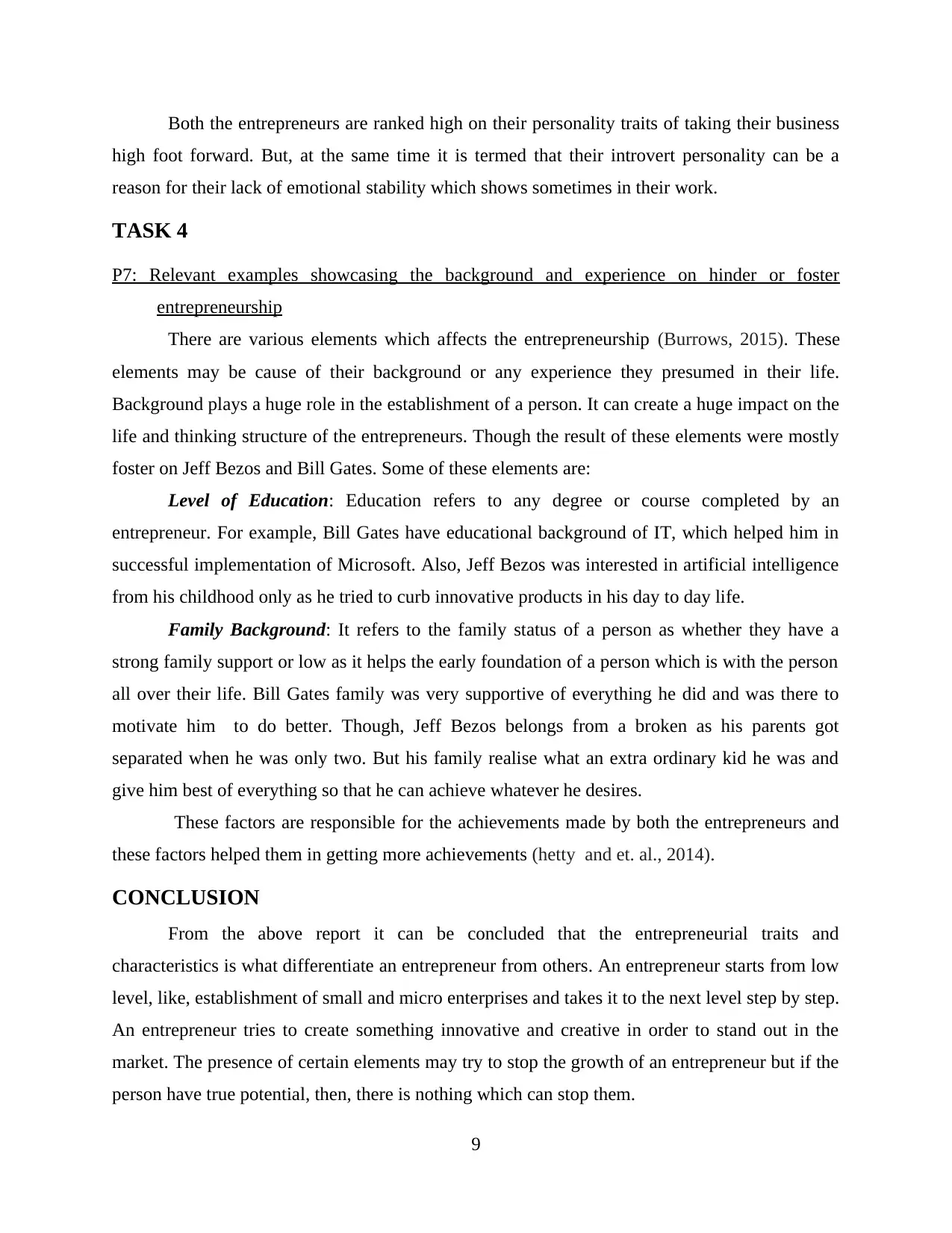
Both the entrepreneurs are ranked high on their personality traits of taking their business
high foot forward. But, at the same time it is termed that their introvert personality can be a
reason for their lack of emotional stability which shows sometimes in their work.
TASK 4
P7: Relevant examples showcasing the background and experience on hinder or foster
entrepreneurship
There are various elements which affects the entrepreneurship (Burrows, 2015). These
elements may be cause of their background or any experience they presumed in their life.
Background plays a huge role in the establishment of a person. It can create a huge impact on the
life and thinking structure of the entrepreneurs. Though the result of these elements were mostly
foster on Jeff Bezos and Bill Gates. Some of these elements are:
Level of Education: Education refers to any degree or course completed by an
entrepreneur. For example, Bill Gates have educational background of IT, which helped him in
successful implementation of Microsoft. Also, Jeff Bezos was interested in artificial intelligence
from his childhood only as he tried to curb innovative products in his day to day life.
Family Background: It refers to the family status of a person as whether they have a
strong family support or low as it helps the early foundation of a person which is with the person
all over their life. Bill Gates family was very supportive of everything he did and was there to
motivate him to do better. Though, Jeff Bezos belongs from a broken as his parents got
separated when he was only two. But his family realise what an extra ordinary kid he was and
give him best of everything so that he can achieve whatever he desires.
These factors are responsible for the achievements made by both the entrepreneurs and
these factors helped them in getting more achievements (hetty and et. al., 2014).
CONCLUSION
From the above report it can be concluded that the entrepreneurial traits and
characteristics is what differentiate an entrepreneur from others. An entrepreneur starts from low
level, like, establishment of small and micro enterprises and takes it to the next level step by step.
An entrepreneur tries to create something innovative and creative in order to stand out in the
market. The presence of certain elements may try to stop the growth of an entrepreneur but if the
person have true potential, then, there is nothing which can stop them.
9
high foot forward. But, at the same time it is termed that their introvert personality can be a
reason for their lack of emotional stability which shows sometimes in their work.
TASK 4
P7: Relevant examples showcasing the background and experience on hinder or foster
entrepreneurship
There are various elements which affects the entrepreneurship (Burrows, 2015). These
elements may be cause of their background or any experience they presumed in their life.
Background plays a huge role in the establishment of a person. It can create a huge impact on the
life and thinking structure of the entrepreneurs. Though the result of these elements were mostly
foster on Jeff Bezos and Bill Gates. Some of these elements are:
Level of Education: Education refers to any degree or course completed by an
entrepreneur. For example, Bill Gates have educational background of IT, which helped him in
successful implementation of Microsoft. Also, Jeff Bezos was interested in artificial intelligence
from his childhood only as he tried to curb innovative products in his day to day life.
Family Background: It refers to the family status of a person as whether they have a
strong family support or low as it helps the early foundation of a person which is with the person
all over their life. Bill Gates family was very supportive of everything he did and was there to
motivate him to do better. Though, Jeff Bezos belongs from a broken as his parents got
separated when he was only two. But his family realise what an extra ordinary kid he was and
give him best of everything so that he can achieve whatever he desires.
These factors are responsible for the achievements made by both the entrepreneurs and
these factors helped them in getting more achievements (hetty and et. al., 2014).
CONCLUSION
From the above report it can be concluded that the entrepreneurial traits and
characteristics is what differentiate an entrepreneur from others. An entrepreneur starts from low
level, like, establishment of small and micro enterprises and takes it to the next level step by step.
An entrepreneur tries to create something innovative and creative in order to stand out in the
market. The presence of certain elements may try to stop the growth of an entrepreneur but if the
person have true potential, then, there is nothing which can stop them.
9
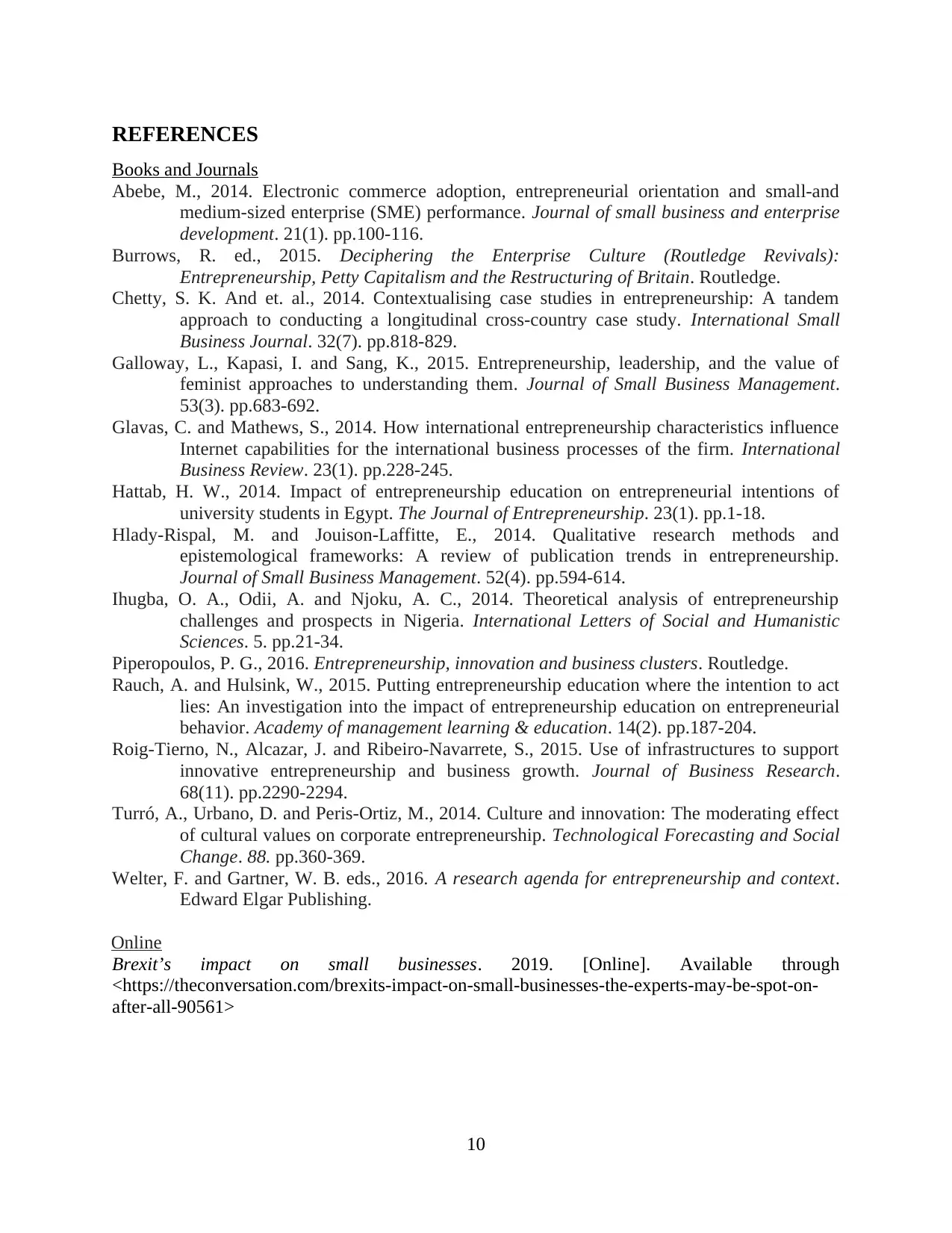
REFERENCES
Books and Journals
Abebe, M., 2014. Electronic commerce adoption, entrepreneurial orientation and small-and
medium-sized enterprise (SME) performance. Journal of small business and enterprise
development. 21(1). pp.100-116.
Burrows, R. ed., 2015. Deciphering the Enterprise Culture (Routledge Revivals):
Entrepreneurship, Petty Capitalism and the Restructuring of Britain. Routledge.
Chetty, S. K. And et. al., 2014. Contextualising case studies in entrepreneurship: A tandem
approach to conducting a longitudinal cross-country case study. International Small
Business Journal. 32(7). pp.818-829.
Galloway, L., Kapasi, I. and Sang, K., 2015. Entrepreneurship, leadership, and the value of
feminist approaches to understanding them. Journal of Small Business Management.
53(3). pp.683-692.
Glavas, C. and Mathews, S., 2014. How international entrepreneurship characteristics influence
Internet capabilities for the international business processes of the firm. International
Business Review. 23(1). pp.228-245.
Hattab, H. W., 2014. Impact of entrepreneurship education on entrepreneurial intentions of
university students in Egypt. The Journal of Entrepreneurship. 23(1). pp.1-18.
Hlady‐Rispal, M. and Jouison‐Laffitte, E., 2014. Qualitative research methods and
epistemological frameworks: A review of publication trends in entrepreneurship.
Journal of Small Business Management. 52(4). pp.594-614.
Ihugba, O. A., Odii, A. and Njoku, A. C., 2014. Theoretical analysis of entrepreneurship
challenges and prospects in Nigeria. International Letters of Social and Humanistic
Sciences. 5. pp.21-34.
Piperopoulos, P. G., 2016. Entrepreneurship, innovation and business clusters. Routledge.
Rauch, A. and Hulsink, W., 2015. Putting entrepreneurship education where the intention to act
lies: An investigation into the impact of entrepreneurship education on entrepreneurial
behavior. Academy of management learning & education. 14(2). pp.187-204.
Roig-Tierno, N., Alcazar, J. and Ribeiro-Navarrete, S., 2015. Use of infrastructures to support
innovative entrepreneurship and business growth. Journal of Business Research.
68(11). pp.2290-2294.
Turró, A., Urbano, D. and Peris-Ortiz, M., 2014. Culture and innovation: The moderating effect
of cultural values on corporate entrepreneurship. Technological Forecasting and Social
Change. 88. pp.360-369.
Welter, F. and Gartner, W. B. eds., 2016. A research agenda for entrepreneurship and context.
Edward Elgar Publishing.
Online
Brexit’s impact on small businesses. 2019. [Online]. Available through
<https://theconversation.com/brexits-impact-on-small-businesses-the-experts-may-be-spot-on-
after-all-90561>
10
Books and Journals
Abebe, M., 2014. Electronic commerce adoption, entrepreneurial orientation and small-and
medium-sized enterprise (SME) performance. Journal of small business and enterprise
development. 21(1). pp.100-116.
Burrows, R. ed., 2015. Deciphering the Enterprise Culture (Routledge Revivals):
Entrepreneurship, Petty Capitalism and the Restructuring of Britain. Routledge.
Chetty, S. K. And et. al., 2014. Contextualising case studies in entrepreneurship: A tandem
approach to conducting a longitudinal cross-country case study. International Small
Business Journal. 32(7). pp.818-829.
Galloway, L., Kapasi, I. and Sang, K., 2015. Entrepreneurship, leadership, and the value of
feminist approaches to understanding them. Journal of Small Business Management.
53(3). pp.683-692.
Glavas, C. and Mathews, S., 2014. How international entrepreneurship characteristics influence
Internet capabilities for the international business processes of the firm. International
Business Review. 23(1). pp.228-245.
Hattab, H. W., 2014. Impact of entrepreneurship education on entrepreneurial intentions of
university students in Egypt. The Journal of Entrepreneurship. 23(1). pp.1-18.
Hlady‐Rispal, M. and Jouison‐Laffitte, E., 2014. Qualitative research methods and
epistemological frameworks: A review of publication trends in entrepreneurship.
Journal of Small Business Management. 52(4). pp.594-614.
Ihugba, O. A., Odii, A. and Njoku, A. C., 2014. Theoretical analysis of entrepreneurship
challenges and prospects in Nigeria. International Letters of Social and Humanistic
Sciences. 5. pp.21-34.
Piperopoulos, P. G., 2016. Entrepreneurship, innovation and business clusters. Routledge.
Rauch, A. and Hulsink, W., 2015. Putting entrepreneurship education where the intention to act
lies: An investigation into the impact of entrepreneurship education on entrepreneurial
behavior. Academy of management learning & education. 14(2). pp.187-204.
Roig-Tierno, N., Alcazar, J. and Ribeiro-Navarrete, S., 2015. Use of infrastructures to support
innovative entrepreneurship and business growth. Journal of Business Research.
68(11). pp.2290-2294.
Turró, A., Urbano, D. and Peris-Ortiz, M., 2014. Culture and innovation: The moderating effect
of cultural values on corporate entrepreneurship. Technological Forecasting and Social
Change. 88. pp.360-369.
Welter, F. and Gartner, W. B. eds., 2016. A research agenda for entrepreneurship and context.
Edward Elgar Publishing.
Online
Brexit’s impact on small businesses. 2019. [Online]. Available through
<https://theconversation.com/brexits-impact-on-small-businesses-the-experts-may-be-spot-on-
after-all-90561>
10
⊘ This is a preview!⊘
Do you want full access?
Subscribe today to unlock all pages.

Trusted by 1+ million students worldwide
1 out of 13
Related Documents
Your All-in-One AI-Powered Toolkit for Academic Success.
+13062052269
info@desklib.com
Available 24*7 on WhatsApp / Email
![[object Object]](/_next/static/media/star-bottom.7253800d.svg)
Unlock your academic potential
Copyright © 2020–2026 A2Z Services. All Rights Reserved. Developed and managed by ZUCOL.


![Entrepreneurship and Small Business Impact Report - [University Name]](/_next/image/?url=https%3A%2F%2Fdesklib.com%2Fmedia%2Fimages%2Fwj%2Fd1f42599211847658d3fd556aa563fa5.jpg&w=256&q=75)


